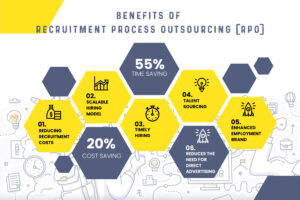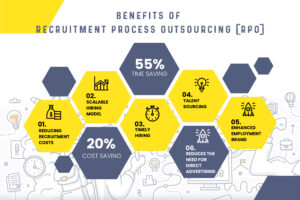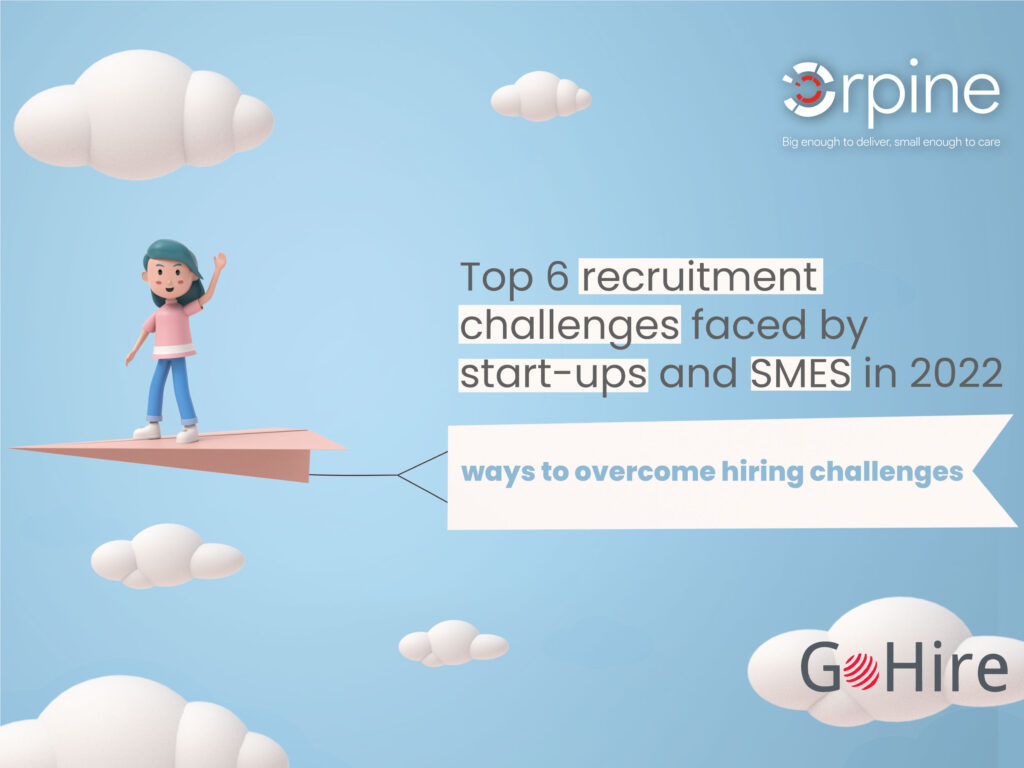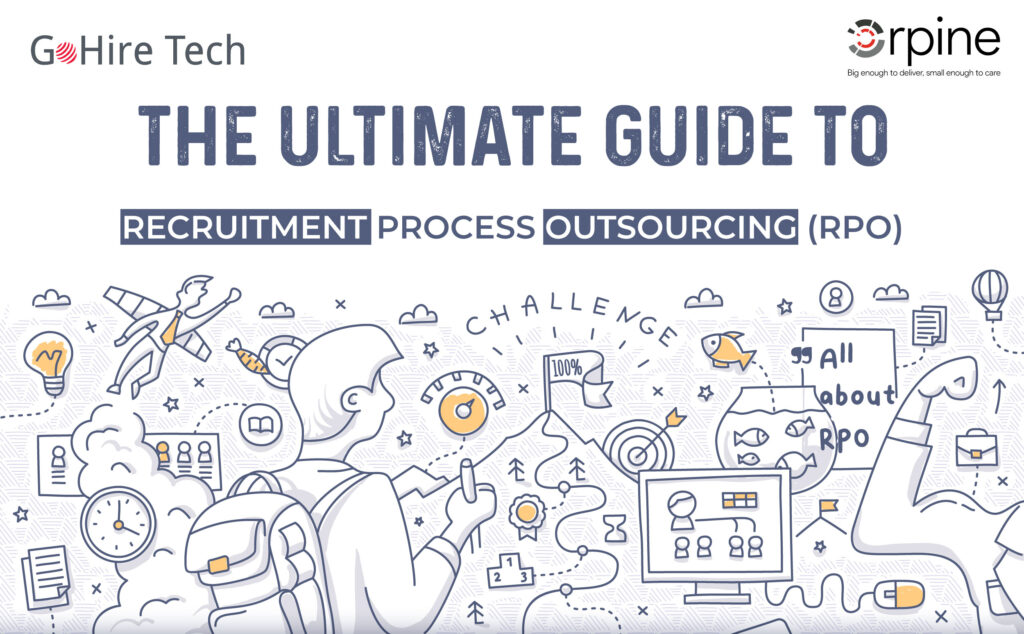-
What is Recruitment Process Outsourcing (RPO)?
Recruitment Process Outsourcing (RPO) is a workforce solution that allows a company to outsource complete or part of its recruitment responsibilities to an external services agency. The recruitment process outsourcing method is intended to bring qualified candidates to a potential employer with as little involvement as possible of its HR & Talent Acquisition staff.
RPO differs significantly from other providers such as staffing firms and contingent / retained search agencies in the sense that, RPO takes ownership of the design and management of the recruitment process, as well as the results.
A seasoned HR professional would be well-versed in the concept of RPO. For those who are exploring, let us discuss the critical aspects of workforce planning and whether one requires it.
-
Our customer’s success story
An illustrative company, MNC Inc. is a multinational organization with a global workforce of 500+ employees based in 3 countries. However, in 2020 the organization was posed with the herculean task of expanding its presence in a new country where it intends to hire talents but does not have a proper brand establishment. Also, the leadership team at MNC Inc wanted to stay focused with what they are good at “technology!” and the rest to be managed by a trusted partner.
Recruitment challenges for MNC Inc.
-
-
Establishing employer brand
-
Sourcing
-
Following compliance and hiring regulations
-
Quality hiring
-
Time-efficient hiring
-
Scalability of the hiring
-
Reducing recruitment cost
-
Some other challenges included finding qualified candidates, finding someone that matches the culture of the company, finding someone that gels well with management and team members, and hiring an employee who would remain loyal to the brand.
GoHire-Orpine to rescue!
When MNC Inc. outsourced their recruitment process to GoHire–Orpine with over 25 years of experience in staff augmentation, our recruiting team became part of MNC Inc’s team, working directly with delivery managers and handling talent acquisition—from posting to selection and everything in between. Within no time, MNC Inc. was able to expand its presence with the right team that’s matching with the company’s culture and ideology.
-
Benefits/ advantages of RPO

-
-
Establishing employer brand
-
Advertising is expensive. When companies work with RPO providers, these costs are significantly reduced. You don’t have to advertise at every regular expensive retailer. The RPO company is responsible for searching for candidates. They don’t come to you; they go to them. You have all the resources you need to keep track of the strongest people available.
The Employment Brand is essentially the company’s identity as an employer, and when all other aspects of the hiring process are in place and successful, the Employment Brand will improve. If the quality of your candidate improves, it will only look good to other potential candidates in your company. If your recruitment manager is happy and works in a consistent recruitment process, people who go through this process can only say good things about your company and your company as an employer. Overall, RPO’s help companies in a variety of ways, as well as reduce hiring costs and fill positions faster. RPO’s help businesses become better workplaces.
-
-
Sourcing
-
Unless you are an established brand with great reach worldwide, your job listings are unlikely to appear on the radar of the most qualified candidates. The local community can only get you for now. According to Glassdoor’s 2020 survey report, 76% of HR managers say that attracting the best talent is their number one hiring challenge. As technology continues to lower geographical barriers, the need for time is to extend your reach to an extensive talent pool.
RPO providers increase the visibility and recognition of their client’s employment brand, engage future potential employees through talent communities and talent pipelines, and pre-screen prospects using a variety of sourcing techniques.
-
-
Following compliance and hiring regulations
-
Recruitment compliance is one of the key recruitment issues to consider at every stage of the recruitment process. At each stage of the hiring process, compliance is an important factor that needs to be considered. Numerous factors fall under the general heading of recruitment compliance, including data security, integration security, GDPR / privacy laws, scoring & weighting, candidates’ background checks, candidate assessments, and so on.
Any disappointment in compliance can bring about financial punishments or sanctions. And afterwards, there’s the stain to your employer brand, corporate brand, and industry reputation. In short- the more complaint the recruitment process will have, the less chance of creating a bad reputation and bad hires.
Thus, compliance entails more than simply avoiding federal fines and lawsuits. It’s all about assembling a diverse and compelling team of employees. Compliance is critical for a successful modern company, whether it’s attracting more female candidates and making them feel safe in the workplace, bringing in international experiences and perspectives, or simply broadening the diversity of ideas.
-
-
Quality hiring
-
From the first phone call to the first day of orientation, high-quality candidates expect a high-quality candidate experience. RPO recruiters use technology to make the process easier, but they also provide high-touch experiences that make the candidate feel important.
RPO recruiters establish rapport with candidates to elicit honest and helpful responses. The ability to build relationships over time is critical to the success of an RPO recruiter. Because great talent tends to recognize other great talent, these connections result in more referrals.
Being able to measure the success of every sourcing strategy, including return on investment, is fundamental to improving the quality of hires you can get.
-
-
Scalable hiring model following compliance and hiring regulations
-
As your company expands or opens new departments, you’ll need more staff, but not in the case of headcount reductions or hiring freezes. The RPO provider has a structure to adapt to any situation. You can grow or shrink your hiring team as needed. At the end of the day, customers pay for what they get. “I have successfully filled my position”, no more, no less. RPO providers are flexible and adaptable to any situation. Prices are based on per seat or per closed position.
-
-
Time-efficient hiring
-
In most cases, time can be a major challenge for hiring the right talent as it involves investing a lot of time sourcing the candidate, conducting the interviews, shortlisting, verifications, and offer release. The internal RPO resource model can be extended to meet the challenges of tight recruitment deadlines.
-
-
Scalability of the hiring
-
As your company expands or opens new departments, you’ll need more staff, but not in the case of headcount reductions or hiring freezes. The RPO provider has a structure to adapt to any situation. You can grow or shrink your hiring team as needed. At the end of the day, customers pay for what they get. “I have successfully filled my position”,. no more, no less. RPO providers are flexible and adaptable to any situation. Prices are based on per seat or per closed position.
-
-
Reducing recruitment cost
-
High cost is one of the biggest reasons companies choose RPO solutions and one of the biggest benefits of RPO. Other companies are just spending lot of their time and resources on long hiring processes and outdated (or missing) methods. RPO providers can reduce hiring costs by streamlining the hiring process and showing them how to better find good candidates in less time and money.
-
RPO Stages in the recruitment process
-
- Identifying and understanding the hiring need
Whether your job listing is new or replacement vacancy, you can’t find what you need without understanding what you need. Therefore, the hiring process should begin by identifying vacancies and then analyzing the job description, such as the knowledge, skills, and experience required for the job.
-
-
Preparing the JD
-
Once you have the exact knowledge, skills, and experience you need, define the roles and responsibilities of that position. Creating a Comprehensive Job Description (JD) helps you know what your prospects need to bring to meet your job requirements. More importantly, prospects are provided with a checklist or list for comparison before applying. This is a tool to make sure you’re getting your application from the right candidates (hopefully).
-
-
Talent Search
-
The most important aspect of the hiring process is identifying, attracting, and motivating the right people to apply for. Job listings need to be promoted internally to generate referrals and externally on popular social networking sites and priority job boards. RPO can help cast a wider web by holding job listings and posting classified ads in industry-leading publications.
-
-
Screening and shortlisting
-
To advance the hiring process, applicants need to be efficiently and accurately selected and added to the candidate pipeline. This is where the hiring process becomes difficult and difficult. Recruiting agencies will have an expert to handpick candidates who are rightfully qualified for the desired role.
-
-
Technical and personal interview
-
Selected applications will now go through the application process before receiving a proposal or rejection notice. RPO can help you plan and schedule multiple interviews seamlessly for each candidate, depending on the size of your hiring team and your individual hiring needs.
-
-
Background check
-
Most businesses have their own particular set of standards for background checks, but the main objective is to have the most accurate picture possible of a candidate before the contract is agreed upon and presented.
The most basic pre-employment screening includes reference checks, verification of previous employment and education, and criminal history checks. Each has its own set of compliance procedures that must be followed.
Working with an RPO provider like GoHire will allow companies to benefit from our expertise when it comes to establishing a comprehensive screening program and speed up hiring.
-
-
Evaluation and releasing the offer
-
This is the final stage of the recruitment process. Do not assume that the candidate will accept your offer. However, when RPO is placed they’ll do their part to make the candidate join the organization. If the candidate has patiently completed all the paperwork and is waiting for the selection process, it is more likely to accept the offer.
-
-
Introduction and Induction of the new employee (Look for training & retention strategy in our next blogs)
-
Induction ensures that new employees are educated on the company’s expectations, performance, and culture. When used strategically, the induction process can help employees understand their role and how it fit into the company, thereby increasing employee retention.
Employees who have gone through a structured induction process with the assistance of RPO will have a good understanding of how the company operates.
-
RPO for small & medium enterprises (SMEs)
There are many business applications, processes, and services available to support the growth of businesses of all sizes. Unfortunately, the myth remains that SMEs cannot take advantage of or take advantage of these benefits. Sure, some of them are too expensive to limit the customer base to high-end companies, but it’s a minority. SMEs can and must take advantage of all the possible benefits they can get.
One of these benefits is RPO. This ranges from recruitment recommendations to the complete recruitment process. You can provide your own staff or work with staff and existing processes to hire the best candidates for each vacant seat.
RPOs do everything to streamline the process, make it faster and more effective, and at the same time attract the most qualified candidates who are most likely to be satisfied in a particular position. Sure, hiring an RPO means paying an ongoing fee, but in most cases, the fee is lower than the cost of doing it all yourself.
-
RPO for MNCs
Over the years, RPO evolved into bespoke services that recognize that hiring is not a panacea. Small businesses can benefit from RPO just like mid-sized, but what about large businesses? These companies often struggle during periods of rapid growth and need to scale down late. In addition, they are competing with large companies that have already established brands and optimized recruitment processes. MNCs benefit greatly from partnering with RPO providers. RPO providers can develop strategies tailored to their employment needs and adapt to future success.
-
RPO for executive search
Use a network of a professional agency to appropriately contact potential executives for the highest-ranked jobs.
Executive search no longer has to be a long, one-month process. Recruitment agencies can understand the importance of speed and can find the right executive for you with world-class executive recruitment solutions. RPO gives you access to executives who have the perfect balance of expertise and experience.
-
RPO for offshoring / nearshoring
Offshoring/ nearshoring outsourcing is the process of having work done for your company by qualified staffing solutions from low-cost regions. Access to other regions with more resources for people with specialized skills can benefit businesses. At the same time, they receive high-quality work at a reduced cost.
Outsourcing of offshore recruitment services for the recruitment process has been around for some time. The fact that it works well for all sizes of businesses has led to an increase in its popularity. Organizations understand the most significant benefit of hiring offshore RPO services is cost savings.
-
How to choose an RPO partner for your business

Choosing the right (RPO) partner is critical to the success of your RPO program. Whether you wish to improve your recruitment process or efficiency or HR brand, collaborating with an RPO partner begins with the selection process.
One must consider the following factors in choosing the PRO:
-
-
Experience:
-
Cost:
-
Reputation:
-
Hiring Process:
-
Hiring timelines:
-
RPO Implementation:
-
Success Stories:
-
There are various factors that determine success or failure of an RPO. Transparency, mutual trust, and seamless communication contribute to RPOs success. RPO is a bespoke service, not a panacea.
Do your research and remember that, the quality of the people you refer to your company is directly related to the quality of your RPO partner . Find a partner that isn’t driven by technology alone. While automation is quickly becoming a rule, humanized conversations can provide valuable insights into candidates’ experience and unique skills, as well as how to grow their business with the right talents.











